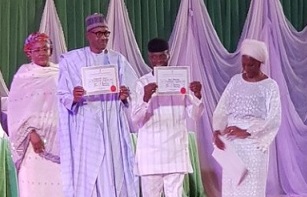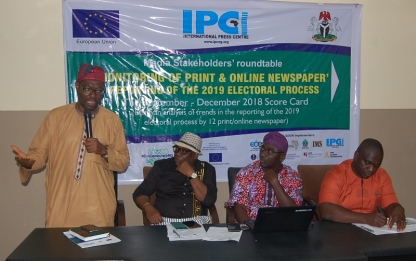-INEC presents Buhari, Osinbajo certificates of return
-By Funmi Falobi-
Muhammadu Buhari, Nigeria’s incumbent president and candidate of the All Progressives Party, APC has won the 2019 presidential election, thereby re-elected for another term of four years.
Buhari polled 15,191,847 votes to defeat his main opponent, Atiku Abubakar of the Peoples Democratic Party, PDP, along with other 71 candidates. Buhari won in 19 states with 15,191,847 votes while Atiku won in 17 state with 11,262,978 votes.
In his acceptance speech, the president thanked Nigerians for re-electing him for the next four years. He also expressed his regret over the loss of lives during the elections in some parts of the country thereby urging the security operatives to step up efforts to protect voters in the forthcoming state-level elections on March 9.
“The new administration will intensify its efforts in security, restructuring the economy and fighting corruption. We have laid down the foundation and we are committed to seeing matters to the end. We will strive to strengthen our unity and inclusiveness so that no section or group will feel left behind or left out,” he said.
However, Atiku Abubakar has rejected the announced result of the election by the Independent National Electoral Commission (INEC), saying he would challenge it in court.
He said that it was obvious that there were deliberate malpractices in many states which negate the results announced.
“I am a democrat and there are democratic avenues available to present the truth to the nation and the watching world. Already, many international observers have given their verdicts, which corroborate our observations.
If I had lost in a free and fair election, I would have called the victor within seconds of my being aware of his victory to offer not just my congratulations, but my services to help unite Nigeria by being a bridge between the North and the South.
However, in my democratic struggles for the past three decades, I have never seen our democracy so debased as it was on Saturday, Feb. 23,” he said.
Consequently, INEC has given President Muhammadu Buhari and Vice-President Yemi Osinbajo certificates of return at the International Conference Centre (ICC), Abuja on Wednesday.
The certificate was presented to the President by the Returning Officer of the election, who is also the Chairman of INEC, Prof. Mahmood Yakubu. The presentation ceremony was observed by the wife of the President and his vice, respectively.

Speaking at the occasion, the president guaranteed Nigerians that they would soon see “a country moving to the `Next Level’ as the administration strengthens on its accomplishments.”
He also promised to continue to engage all parties as his administration would be operating an open government for the general progress of the country.



 The ever Lagos busy roads were deserted and teenagers and youths turned the roads to football playing fields. For instance, the stretch of Agege road linking Oba Akran was turned to football fields by different groups of youths.
The ever Lagos busy roads were deserted and teenagers and youths turned the roads to football playing fields. For instance, the stretch of Agege road linking Oba Akran was turned to football fields by different groups of youths.

 “Media content monitoring is very important. IPC is not the only one monitoring the media, the international organizations also do and they release reports after the elections. The public is also interested in how well the media is doing, to see to what extent we capture the public interest. If the media get it right, the electoral body will also get it right. One single report can spark up crisis via hate speech. As journalists, our duty is to go beyond what politicians say and report peaceful conduct of elections”, he said.
“Media content monitoring is very important. IPC is not the only one monitoring the media, the international organizations also do and they release reports after the elections. The public is also interested in how well the media is doing, to see to what extent we capture the public interest. If the media get it right, the electoral body will also get it right. One single report can spark up crisis via hate speech. As journalists, our duty is to go beyond what politicians say and report peaceful conduct of elections”, he said.





